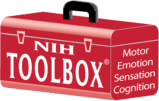
Tablet
Cognitive Screener
Overview of Development
MyCog development was originally funded by the National Institute on Aging, NIH (5UH3NS105562), to offer a brief, readily available, standard set of CI screening measures applicable for use in diverse settings and with diverse populations. MyCog is designed to be self-administered during a clinic visit and is linked to the clinic’s electronic health records system (EHR) so results auto populate as soon as the patient completes their assessment. MyCog is comprised of two cognitive measures adapted from the NIH Toolbox® (Dimensional Change Card Sort and Picture Sequence Memory) for in-clinic self-administration and implemented as a downloadable app on an iPad. MyCog is currently being used in Northwestern Medicine clinics as part of the Toolbox Detect project (R01AG069762), an NIH-Funded pragmatic clinical trial and will soon be implemented in Access Community Health Network clinics as part of the same trial. It is also being used as part of the MyCog Trial project (U01NS105562) at Oak Street Health clinics.
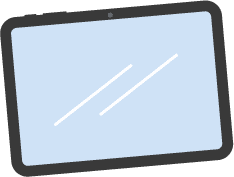
Equipment Needed
All MyCog Tablet measures require an iPad with iOS 17.0 or higher to administer.
How it Works
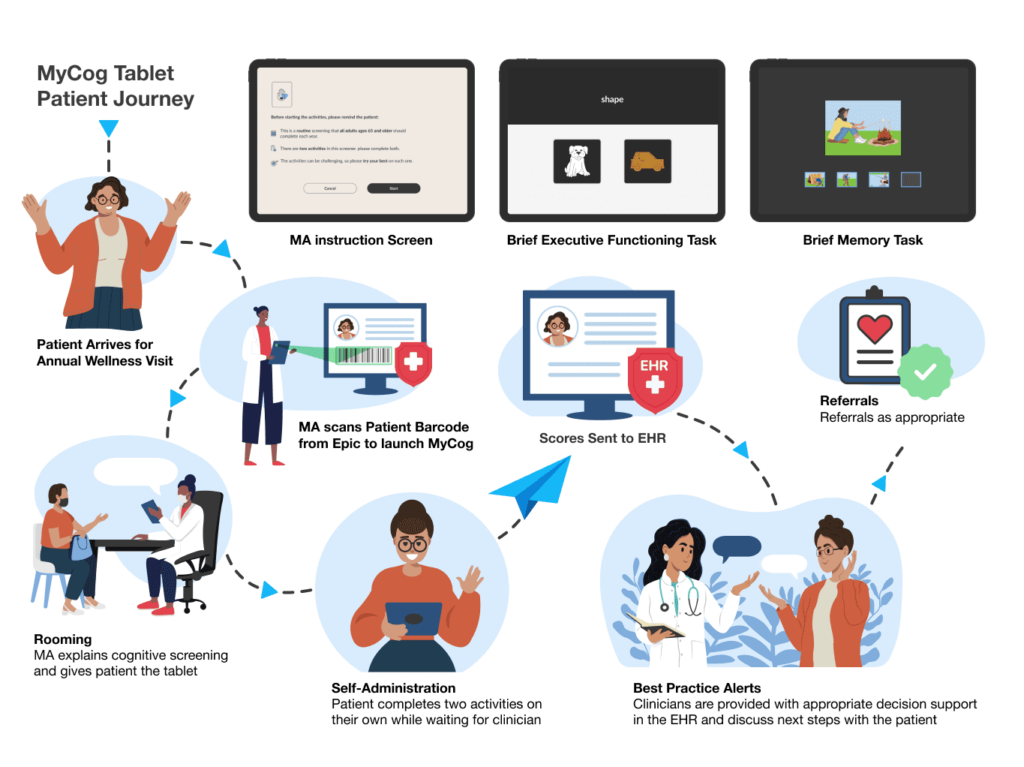
Measures
MyCog Dimensional Change Card Sort (DCCS)
MyCog Dimensional Change Card Sort (DCCS) is an executive functioning measure which asks participants to sort images by color or shape as quickly as they can.
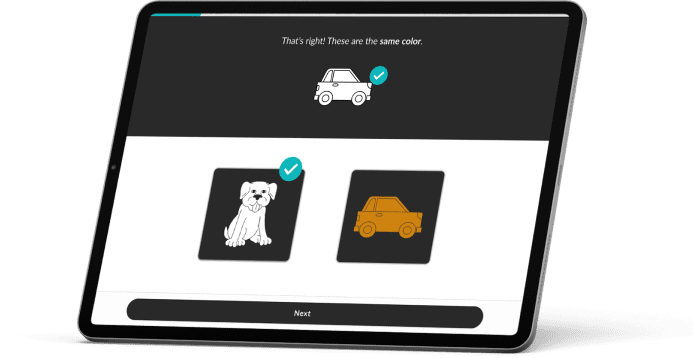
MyCog Picture Sequence Memory (PSM)
MyCog Picture Sequence Memory (PSM) is an episodic memory measure which presents a sequence of 12-picture cards along with audio descriptions, then scrambles the cards and asks the participants to place them in the order they were presented.
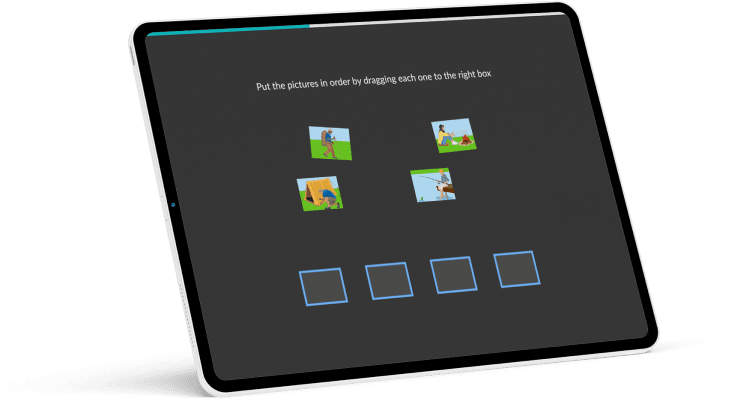
Principal Investigators:
Cindy Nowinski, MD, PhD,
Research Professor, Department of Medical Social Sciences, Northwestern University Feinberg School of Medicine
Michael Wolf, PhD, MPH, MA,
James R. Webster, Jr. Professor of Medicine, Division of General Internal Medicine, Director of the Center for Applied Health Research on Aging, Northwestern University Feinberg School of Medicine
Richard Gershon, PhD,
Professor, Department of Medical Social Sciences, Northwestern University Feinberg School of Medicine
NIH Program Officers:
Partha Bhattacharyya, PhD,
Program Officer, Toolbox Detect
Division of Behavioral and Social Research,
National Institute on Aging
Rebecca Hommer, M.D.,
Program Officer, MyCog Trial
Division of Clinical Research, National Institute of
Neurological Disorders and Stroke
Roderick Corriveau, PhD,
Program Officer, MyCog Trial
Division of Neuroscience,
National Institute of Neurological Disorders and Stroke
Northwestern University Feinberg School of Medicine Project Scientists:
Adin-Cristian Andrei, PhD
Michael Bass, MS
Stephanie Batio, MS
Julia Yoshino Benavente, MPH
Morgan Bonham, BS
Greg J Byrne, MA
Andrew Cooper, MPH MS
Laura Curtis, MS
Sarah Filec, MPH
Callie Jones, BA
Rebecca Lovett, PhD
Andrea Russell, PhD
Lihua Yao, PhD
Stephanie Ruth Young, PhD
Sponsors:
MyCog funding was provided by the National Institute of Neurological Disorders and Stroke (NINDS; grant 5UH3NS105562, U01NS105562) and the National Institute on Aging (NIA; grant 5UH3NS105562, R01AG069762).
Mobile
Cognitive Screener
Overview of Development
MyCog Mobile is the smartphone-based counterpart to MyCog. MyCog Mobile was funded by the National Institute on Aging, NIH (1R01AG074245-01), to offer a cognitive screening app that participants can self-administer remotely on personal smartphones and send results directly to their primary care provider’s EHR. Evidence from pilot studies, where older adults downloaded the app on their own smartphones, has demonstrated acceptable reliability and usability of MyCog Mobile. MyCog Mobile is currently undergoing a large clinical and construct validation to understand its ability to detect pathological cognitive decline in older adult populations.

Equipment Needed
All MyCog Mobile measures require an iPhone to properly administer (Android coming soon)
How it Works
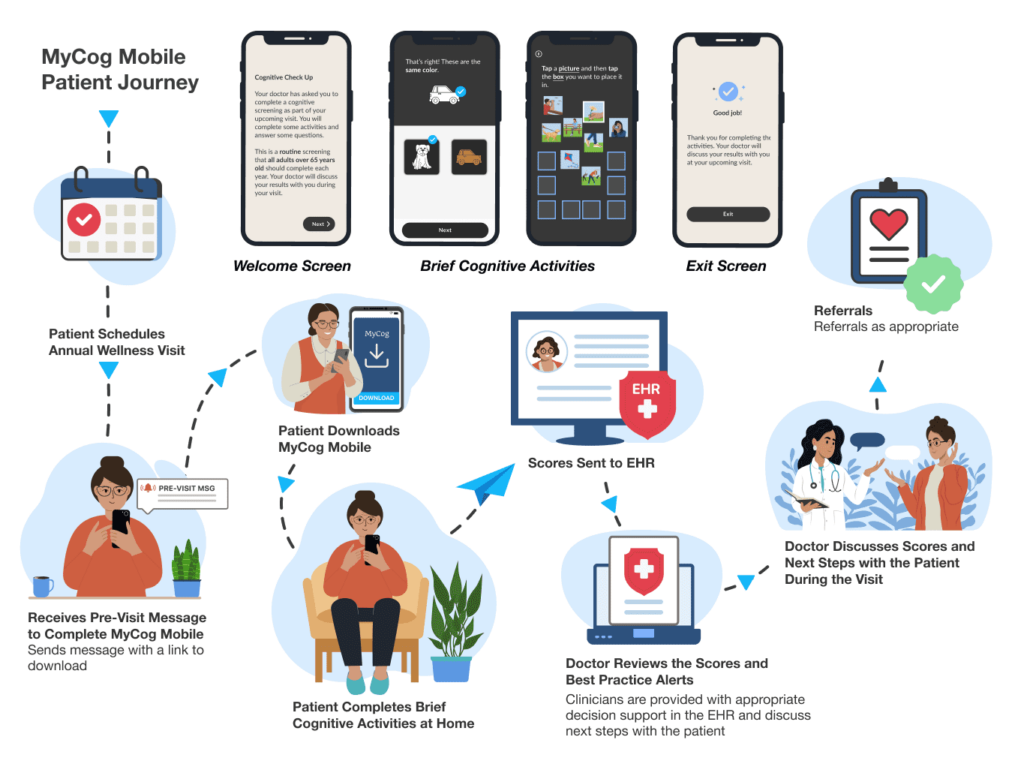
Measures
MyFaces is an associative memory test that has been shown to predict cerebral amyloid beta burden. Participants are first shown 12 pictures of people paired with their names. After an approximately five-to-ten-minute delay, participants’ memories of the faces are tested.
MySorting is an executive functioning measure which asks participants to sort images by color or shape as quickly as they can.
MySequences is a measure of working memory test that requires participants to remember strings of letters and numbers and arrange them in order, with the letters in alphabetical order first and then the numbers in ascending numerical order.
MyPictures is an episodic memory measure which presents a sequence of 12-picture cards along with audio descriptions, then scrambles the cards and asks the participants to place them in the order they were presented.
Principal Investigators:
Cindy Nowinski, MD, PhD,
Research Professor, Department of Medical Social Sciences, Northwestern University Feinberg School of Medicine
Michael Wolf, PhD, MPH, MA,
James R. Webster, Jr. Professor of Medicine, Division of General Internal Medicine, Director of the Center for Applied Health Research on Aging, Northwestern University Feinberg School of Medicine
NIH Program Officers:
Erin Harrel, PhD,
Division of Behavioral and Social Research, National Institute on Aging
Northwestern University Feinberg School of Medicine Project Scientists:
Adin-Cristian Andrei, PhD
Michael Bass, MS
Stephanie Batio, MS
Julia Yoshino Benavente, MPH
Morgan Bonham, BS
Greg J Byrne, MA
Anna Chorniy, PhD
Andrew Cooper, MPH MS
Laura Curtis, MS
Elizabeth M Dworak, PhD
Sarah Filec, MPH
Richard Gershon, PhD
Callie Jones, BA
Rebecca Lovett, PhD
Andrea Russell, PhD
Lihua Yao, PhD
Stephanie Ruth Young, PhD
Sponsors:
MyCog Mobile funding was provided by the National Institute on Aging (NIA) grant number 1R01AG074245-01.
